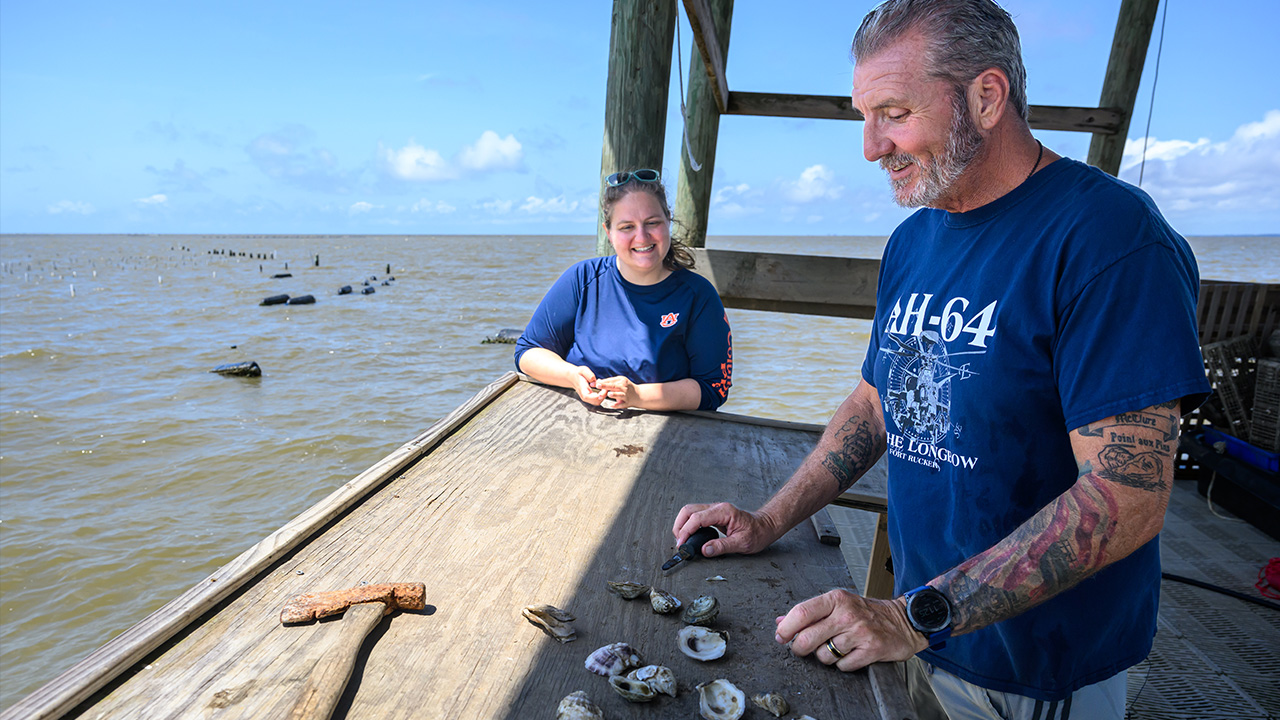content body
In 2019, a massive influx of fresh water from the Mississippi River overflowed into the salty Mississippi Sound, devastating coastal aquatic life. Auburn University student Jill Sower, who arrived a year later to study Gulf Coast oysters, remembers the aftermath.

Doctoral student Jill Sower has traveled the coast visiting oyster farmers like Hugh McClure, owner of the Point aux Pins oyster farm in Grand Bay, Alabama.
“We would depart from a well-known fishing spot, and whenever we came back, there would be fisherman trying to look at our bushel baskets to see if we found anything live, and it would always just be empty shells,” she said. “There was a 100% mortality rate across Mississippi’s historic oyster reefs. It was just so sad.”
A native of Harrisonburg, Virginia, and a student in the College of Forestry, Wildlife and Environment, Sower will graduate this December with a doctorate in earth system science. Her research on Alabama’s oyster farming industry has earned her a prestigious year-long Science Policy Fellowship from the National Academies of Science, Engineering and Medicine’s Gulf Research Program.
From one Gulf state to another
After witnessing the collapse of Mississippi’s oyster reefs, Sower, who holds a bachelor’s degree in wildlife conservation from Virginia Tech and a master’s in coastal science from the University of Southern Mississippi, knew she wanted to continue her research. With support from the Mississippi-Alabama Sea Grant Consortium, she enrolled in Auburn's doctoral program and put her knowledge of bivalves and coastal science to work as she developed expertise in the political and economic aspects of the Gulf Coast oyster farming industry.

“I knew I wanted to come back to the Gulf because I love it,” she said. “And I wanted to become a more well-rounded scientist and get experience in both the quantitative and the qualitative side of things.”
The ‘qualitative side of things’
Under the guidance of co-advisor Professor Christopher Anderson, Sower built relationships with farmers, resource managers and other stakeholders.
“Jill’s research is really focused on a natural resource management issue — it’s as much about the people as it is the oysters,” Anderson said.
Sower has traveled the coast, visiting Alabama oyster farmers in areas of Mobile, Dauphin Island and Bayou La Batre. While farmers are used to regulators and resource managers stopping by, Sower’s visits stood out. Hugh McClure, owner of the Point aux Pins oyster farm in Grand Bay, Alabama, said a conversation with her makes him feel like someone is really listening.

Under the guidance of co-advisor Professor Christopher Anderson, left, Sower has built relationships with farmers, resource managers and other stakeholders.
“It’s so nice to know I can reach out to Jill with a concern and she will respond quickly,” McClure said. “It has been wonderful how she’s brought attention to Point aux Pins, as I’m sure she has done for other farms.”
Building community
Beyond her fieldwork, Sower developed the first Gulf Coast oyster industry community of practice, bringing together oyster harvesters, seafood processors, researchers and government leaders. Their discussion topics ranged from oyster mortality and water quality to crop insurance, public health regulations and food safety.
“The whole point of a community of practice is to share knowledge, tools and experience and to increase communication and collaboration across different stakeholder groups, and I think we’ve achieved that,” Sower said.
Looking ahead
This fall, Sower will defend her four-chapter dissertation, which includes a comprehensive policy analysis, 62 stakeholder interviews and strategies for mitigating challenges like hurricanes, drought and flooding.
She hopes to publish all four chapters soon so her research is accessible to regulatory authorities. While wild oyster harvesting has been going on for generations, Alabama’s commercial farming industry wasn’t launched until 2009. Sower believes the industry’s growth calls for updated regulations — and that her findings can help.
“Once I get those published, they can help spur some change,” she said. “I hope it will bring awareness to the issues the farmers face, challenges that can hopefully be resolved through regulations that are more conducive to farmers keeping and growing their businesses.”
Regarding the oysters Sower once studied on the Mississippi Sound, there is new evidence this year that they’re returning. It’s that resilience — and the dedication of those who care for the species — that continues to inspire Sower’s work.




